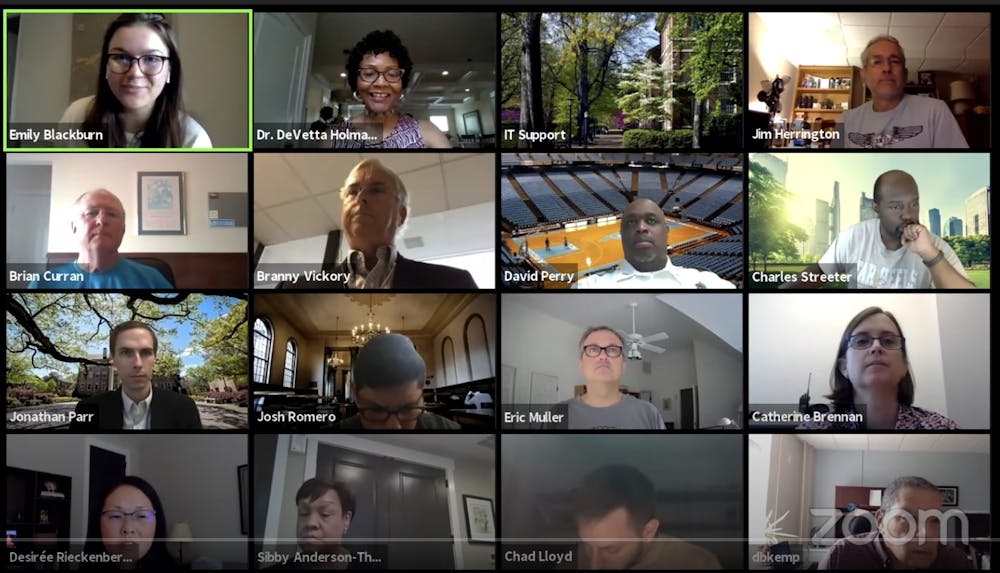Community standards
Derek Kemp, associate vice chancellor for campus safety and risk management, also answered questions about how community standards will be implemented upon students’ return to campus.
“A consistent concern that I've had is not as much for the roadmap for reopening, about the things that we can control within the bounds of the campus, but particularly concerned about the vulnerability that Greek life, frankly, and the social life of Chapel Hill play for our campus community,” Kim Strom, a professor in the School of Social Work, said in the meeting. “… I want to flag this for our group because of course the recklessness of any part of our student body will be borne highly by vulnerable older people on campus and by service workers of color, housekeepers and other folks.”
Kemp responded to Strom’s concern by saying that although no specific guidelines have been made, the University is continuing to speak with Greek life organizations as well as local government to enforce community standards.
“It does us no good if we have this absolute standard on this side of the street and it evaporates on Franklin Street,” Kemp said. “So there is an ongoing dialogue certainly regarding Greek Life. I'm not aware of a resolution, but I know that that's a topic of keen conversation.”
Desirée Rieckenberg, dean of students, added that Executive Vice Chancellor and Provost Bob Blouin has committed to providing care kits containing face masks for students and employees who will be working on-site.
Muller questioned whether the politicization of wearing masks could become a problem for UNC's campus as a public university, with certain student organizations potentially refusing to wear them as a civil liberties issue.
“In an election year, I would be shocked if that didn't come up as part of the discussion,” Kemp said. “... I am planning to have those kinds of conversations.”
Rieckenberg added that there is a public health working group developing messaging to encourage students to follow community standards, such as wearing face masks.
Student concerns
Reeves Moseley, student body president, and Chad Lloyd, secretary of the Graduate and Professional Student Federation, joined the call to discuss the concerns of students returning to campus.
Lloyd mentioned that GPSF recently sent a survey to graduate and professional students, which found that the majority did not think it was a good idea to come back to campus and were worried about their safety. He asked members how community standards would be enforced and what mental health support would be given to students dealing with trauma from the virus.
To get the day's news and headlines in your inbox each morning, sign up for our email newsletters.
UNC Police Chief David Perry said that his department will not be involved in enforcing mask-wearing and hopes to only deal with “breaches of the peace” to deescalate a situation.
Rieckenberg said that students could face a variety of repercussions for not following community standards, depending on the severity of the circumstance. She said it could range from students being asked to transfer to remote-only learning, to potentially facing legal action if they intentionally try to spread the virus.
“We’re dealing with a pandemic, so we're going to have to be willing to make some tough choices when it comes to complete noncompliance,” Perry said. “A student’s ability to continue to be a student, an employee's ability to continue to be employed, if they're not willing to help keep our community safe and save lives.”
As for mental health support, Rieckenberg said that Counseling and Psychological Services is working to hire up to four new counselors, and several professional schools are also allocating more resources towards mental health resources.
Moseley said students are still concerned about what an “off-ramp” could look like that would force students to leave campus, and what conditions would lead to that.
Muller mentioned that the Faculty Executive Committee has been pressing this question to the chancellor and provost. He said that at the committee’s most recent Community Conversation with Chancellor Kevin Guskiewicz, he identified three criteria for initiating an off-ramp.
Muller said these criteria include the existence of large clusters of infection, the extent to which health care resources are overextended and pervasive noncompliance with community standards.
“The more clarity we can have about off-ramps before the semester begins, the better position we will be in to know when the moment has come,” Muller said.
The commission’s next meeting will be held on Aug. 5 from 9 a.m. - 11 a.m.
@kyle_ingram11
university@dailytarheel.com




